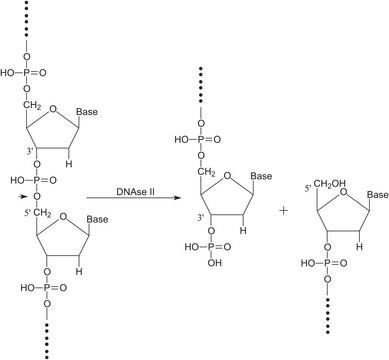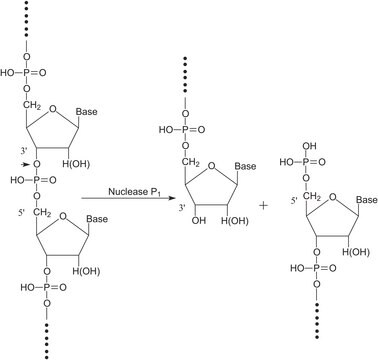D4138
Deoxyribonuclease II from porcine spleen
Type IV, lyophilized powder, 2,000-6,000 Kunitz units/mg protein (biuret)
Synonyme(s) :
DNase II, Deoxyribonucleate 3′-oligonucleotido-hydrolase
Se connecterpour consulter vos tarifs contractuels et ceux de votre entreprise/organisme
About This Item
Produits recommandés
Type
Type IV
Forme
lyophilized powder
Activité spécifique
2,000-6,000 Kunitz units/mg protein (biuret)
Poids mol.
45 kDa
Composition
Protein, 60-80%
Activité étrangère
RNase ≤0.05%
Température de stockage
−20°C
Application
DNase II from Sigma has been used to treat transformed cells during the purification of β-lactamase. It has also been used for the preparation of adenoma tissue in a study that investigated the effect of somatoprim on growth hormone secretion in human adenoma cell cultures (hSA).
Deoxyribonuclease II from porcine spleen has been used in an immunohistological study of the immune system cells in paraffin-embedded tissues. Deoxyribonuclease II from porcine spleen has also been used in a study to investigate its reassociation with the lysosomal membrane.
Actions biochimiques/physiologiques
The enzyme is a lysosomal acid hydrolase that hydrolyzes DNA to 3′-phosphoryl oligonucleotides in the absence of metal ions, under acidic conditions. It is a non-covalently linked α·β heterodimer of approximately 45,000 Da molecular mass.
Définition de l'unité
One Kunitz unit will produce a ΔA260 of 0.001 per min per mL at pH 4.6 at 25°C; [Mg2+] = 0.83 mM
Forme physique
Contains sodium chloride
Code de la classe de stockage
11 - Combustible Solids
Classe de danger pour l'eau (WGK)
WGK 3
Point d'éclair (°F)
Not applicable
Point d'éclair (°C)
Not applicable
Faites votre choix parmi les versions les plus récentes :
Déjà en possession de ce produit ?
Retrouvez la documentation relative aux produits que vous avez récemment achetés dans la Bibliothèque de documents.
Les clients ont également consulté
F Chianini et al.
Veterinary immunology and immunopathology, 82(3-4), 245-255 (2001-10-06)
The distribution of different cells of the immune system has been studied in formalin-fixed paraffin-embedded tissues from conventionally reared healthy pigs, using immunohistological techniques. The samples collected were: lungs, tonsils, lymph nodes (mediastinal, mesenteric, inguinal and submandibular), pancreas, spleen, liver
C C Wang et al.
The Journal of biological chemistry, 273(27), 17192-17198 (1998-06-27)
Porcine spleen DNase II, a lysosomal acid hydrolase, is a noncovalently linked alpha.beta heterodimer (Liao, T.-H. (1985) J. Biol. Chem. 260, 10708-10713). The alpha subunit, after disulfide cleavage, yields two chains, alpha1 and alpha2. The complete amino acid sequences of
U Plöckinger et al.
European journal of endocrinology, 166(2), 223-234 (2011-11-09)
Somatostatin analogues (SSA) reduce autonomous GH secretion by activating somatostatin receptors (sst) 2 and 5 in 50-60% of acromegalic patients. However, by inhibiting insulin secretion these SSA reduce glucose tolerance. DG3173 is a novel SSA with additional binding to sst4
Yoko Kato-Toma et al.
The Biochemical journal, 371(Pt 1), 175-181 (2003-01-07)
13C-NMR spectroscopy was used to estimate the p K a values for the Tyr(150) (Y150) residue in wild-type and mutant class C beta-lactamases. The tyrosine residues of the wild-type and mutant lactamases were replaced with (13)C-labelled L-tyrosine ([ phenol -4-(13)C]tyrosine)
Lars Holmgren
Biochemical and biophysical research communications, 396(1), 147-151 (2010-05-25)
Horizontal or lateral gene transfer is an effective mechanism for the exchange of genetic information in bacteria allowing bacterial diversification and facilitating adaptation to new environments. Recent data demonstrate that DNA may also be transferred between somatic cells via the
Notre équipe de scientifiques dispose d'une expérience dans tous les secteurs de la recherche, notamment en sciences de la vie, science des matériaux, synthèse chimique, chromatographie, analyse et dans de nombreux autres domaines..
Contacter notre Service technique







